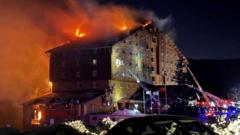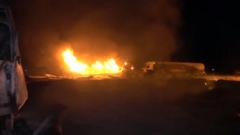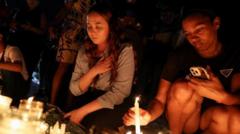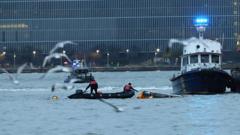Survivors report a lack of fire alarms and delayed firefighter response, as officials dispute hotel safety certifications amid growing scrutiny.
**Tragic Fire at Kartal Hotel Raises Questions About Safety Practices**

**Tragic Fire at Kartal Hotel Raises Questions About Safety Practices**
A devastating hotel fire in Turkey's Kartalkaya ski resort claims at least 76 lives, highlighting glaring safety lapses.
The tragic fire that erupted at the Grand Kartal Hotel during the early hours of Monday has claimed at least 76 lives, marking one of the most catastrophic incidents in Turkey’s recent history. As the ski resort hosted a significant influx of tourists for the school holiday, survivors articulated their shock and disbelief about the inadequate fire safety measures in what was presumed to be a well-equipped establishment.
Reports indicate that the flames ignited at approximately 03:27 a.m. (00:27 GMT) in the hotel restaurant on the fourth floor. Eyewitnesses convey that the fire alarm failed to sound, with some guests detecting smoke up to an hour before authorities were alerted. The Turkish interior minister confirmed that firefighters arrived approximately 45 minutes after the blaze started, a delay that left many guests helpless as they attempted to escape from burning upper floors.
Culture and Tourism Minister Mehmet Nuri Ersoy stated that the hotel possessed a fire competence certificate from the fire department, but this claim has come under fire from Bolu Mayor Tanju Ozcan, who asserted that no positive fire safety report had been issued since 2007. Survivor accounts reveal harrowing experiences, with guests forced to resort to makeshift escape plans, including tying bed sheets together to flee.
Kazim Beceren, president of the Turkish Fire Protection and Education Foundation, noted that well-designed fire safety systems are expected to alert occupants within seconds of smoke detection. Professional assessments highlight that the death toll was alarmingly high for a structure of this type, potentially suggesting severe inadequacies in fire detection and suppression systems.
Erol Percin, an official from the Union of Chambers of Turkish Engineers and Architects, emphasized that fire safety measures appeared to be lacking, particularly regarding the building's exterior cladding which should have been entirely fire-resistant. Indeed, he expressed concern that the fire's rapid spread indicated either a complete lack of fire systems or inadequate design based on relevant safety standards.
In total, there were 238 guests at the Grand Kartal Hotel when the fire erupted. Under ideally functioning emergency protocols, evacuation for such a large number of occupants should take between 15 and 30 minutes. However, numerous guests reported confusion and chaos as the alarm systems did not trigger.
The investigation surrounding this disturbing incident has led to the detention of nine individuals, including the hotel owner. Calls have been made for stringent audits of older structures in light of changing safety regulations, with experts advocating for immediate actions to ensure compliance before future disasters occur.
While the hotel's management expresses condolences and is cooperating with authorities, the lingering question remains: How did such a tragic and avoidable incident unfold in what should have been a safe environment for tourists?
Reports indicate that the flames ignited at approximately 03:27 a.m. (00:27 GMT) in the hotel restaurant on the fourth floor. Eyewitnesses convey that the fire alarm failed to sound, with some guests detecting smoke up to an hour before authorities were alerted. The Turkish interior minister confirmed that firefighters arrived approximately 45 minutes after the blaze started, a delay that left many guests helpless as they attempted to escape from burning upper floors.
Culture and Tourism Minister Mehmet Nuri Ersoy stated that the hotel possessed a fire competence certificate from the fire department, but this claim has come under fire from Bolu Mayor Tanju Ozcan, who asserted that no positive fire safety report had been issued since 2007. Survivor accounts reveal harrowing experiences, with guests forced to resort to makeshift escape plans, including tying bed sheets together to flee.
Kazim Beceren, president of the Turkish Fire Protection and Education Foundation, noted that well-designed fire safety systems are expected to alert occupants within seconds of smoke detection. Professional assessments highlight that the death toll was alarmingly high for a structure of this type, potentially suggesting severe inadequacies in fire detection and suppression systems.
Erol Percin, an official from the Union of Chambers of Turkish Engineers and Architects, emphasized that fire safety measures appeared to be lacking, particularly regarding the building's exterior cladding which should have been entirely fire-resistant. Indeed, he expressed concern that the fire's rapid spread indicated either a complete lack of fire systems or inadequate design based on relevant safety standards.
In total, there were 238 guests at the Grand Kartal Hotel when the fire erupted. Under ideally functioning emergency protocols, evacuation for such a large number of occupants should take between 15 and 30 minutes. However, numerous guests reported confusion and chaos as the alarm systems did not trigger.
The investigation surrounding this disturbing incident has led to the detention of nine individuals, including the hotel owner. Calls have been made for stringent audits of older structures in light of changing safety regulations, with experts advocating for immediate actions to ensure compliance before future disasters occur.
While the hotel's management expresses condolences and is cooperating with authorities, the lingering question remains: How did such a tragic and avoidable incident unfold in what should have been a safe environment for tourists?






















